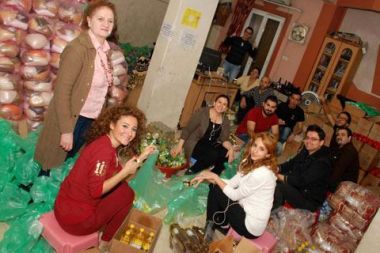Why the Church in Egypt is still the hope of the world
A few weeks ago I was in Alexandria in Egypt, not far from St Mark's Cathedral where a suicide bomber struck on Palm Sunday.
As those of us who have regularly passed through Westminster on our way to work or just for a visit know, to have been close to the site of an horrific terrorist attack is always unnerving.
I was in Alexandria to attend a compassion and justice gathering with people from across Egypt and the Middle East. The day before I flew to the country some Christians had been murdered in North Sinai, forcing hundreds to flee the province. In fact, some of the Christians at the gathering had been comforting the grieving families just before travelling to Alexandria.
We're becoming increasingly aware that this is a country facing a huge rise in persecution against Christians.
And yet, in spite of the pain and suffering, my encounters with Egyptian Christians there were humbling. I could have found them scared and cowering, hiding out awaiting better times or battening down the hatches, but here was a group of people pressing into the tough issues they were facing daily. Instead of ignoring the problems, they were asking what could be done; they understood the vital need to work together as well as with the country's Muslim majority. They were turning to God to find a way through the mess.
One woman told me a story of what happened when a local church which ran children's groups was recently burnt down. They were despairing at the situation but then a child posted a note on the front of the church which said: 'I love you'. These simple words were not just a comfort but a message to not give up; it made the woman more determined to stand up against the injustice she was experiencing.
The Christians at the gathering weren't afraid to disagree with each other or challenge the biblical teachers speaking, often taking the microphone and interrupting a session with their own stories and experiences. Here were drugs workers, counsellors, youth workers, specialist disability workers, church leaders, peacemakers and entrepreneurs; the gathering was full of energy and optimism. Here were Jesus' kind of people.
We can think of the Church in Egypt as persecuted, but let's also think of it as powerful.
About a week after I came back from Alexandria, I saw an image which once again changed my perception of what it looks like to live in a place of suffering.
This time it was of another city in the Middle East: Aleppo. Having watched so much news and internet coverage of the devastating civil war, I feel like I know a thing or two about what conflict looks and feels like. Screaming parents, lost children, bombed-out buildings.
But this image of Tearfund's partner in Aleppo rocked my world. It's not the sharpest, most striking photo I've ever seen, but it made me look at everything differently. It changed my perceptions of Syrians and how they are grappling with their own crisis.

In fact, so unusual is the image that when I showed it to a group of young people and asked them which country they thought this picture was from they said they thought it was from South America or even the UK. No one guessed it was from inside the heart of the Syrian civil war.
The image shows a group of Christians in Aleppo preparing food parcels to hand out across the city. They are smiling directly at the camera, they're well dressed, the women are listening to music on their phones or ipods; they look like they are having a good time. Other photos of the volunteers in the church show the group fooling around and joking with each other. In one, a woman is posing with a plastic bag on her head and laughing.
This photo reminded me of the humanity of the Syrian people; it reminded me that they laugh sometimes, and do stuff just for fun. I don't want to play down the extreme fear and grief they must be living in, but I also don't want to reduce all Syrian people to victims. This photo shows me their resilience, their courage; their perseverance but it also inspires me that the Church, however ground down, is rooted in a profound and prophetic joy. It's almost disturbing because it's so counter to what I could imagine feeling like in that place at this time.
It's too easy to limit people to helpless victims, unable to speak or act in the face of the worst kind of brutality. We can create images of them in our minds, even at times believing that we are their saviours. We limit people all the time to their circumstances, rather than their potential or character, and lump people all together under one reductive label. So often we miss the nuance of a person or a place, and become convinced that what we see in the news is the whole story.
The Church is so multi-layered and diverse. The image of the volunteers in Aleppo and my experience in Alexandria have reminded me that the Church is bigger than I think. It's more resilient than I often view it as; more sacrificial than I can ever be by myself, more courageous that I give it credit for; joyful even in the worst of times. As much as I can stereotype individuals, I can also stereotype the Church, looking at it through the lens of my own white, western, middle-class experience. That's why I'm emboldened by these recent moments of revelation: the Church really is the hope of the world.
Katherine Maxwell-Rose is a writer, speaker and activist campaigning on issues of social justice and transformation.











